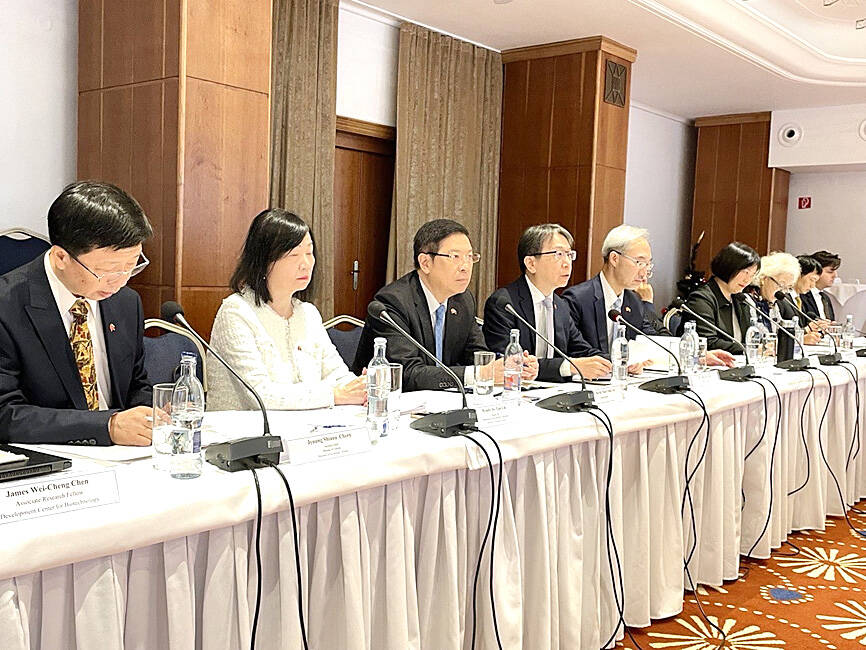Taiwan and Slovakia on Friday signed three memorandums of understanding (MOUs), pledging to boost bilateral trade, exchanges between start-ups and collaborations on nurturing talent for the semiconductor sector.
The memorandums were signed between the Importers and Exporters Association of Taipei and the Council of Slovak Exporters; Taiwan’s Startup Terrace and Slovak Business Agency; and National Sun Yat-sen University and the Slovak University of Technology in Bratislava.
The signing in Bratislava was part of the second session of the Taiwanese-Slovak Commission on Economic Cooperation attended by a Taiwanese delegation led by Deputy Minister of Foreign Affairs Tsai Ming-yen (蔡明彥).

Photo: CNA
During the session, Tsai and Slovak State Secretary of the Ministry of the Economy Peter Gerhart exchanged ideas on how to boost bilateral trade and economic cooperation.
Taiwan and Slovakia have seen warming relations over the past few years, and the two sides hope to expand their collaborations on semiconductors, electric vehicles and the space industry, Tsai said.
He invited Slovak officials to attend next year’s session of the commission in Taiwan.
Other topics discussed on Friday included renewable energy, biotechnology, and space and science programs, he said.
The two sides agreed to continue to consolidate their substantial partnership, he said.
The Taiwanese delegation comprised representatives from the Ministry of Economic Affairs, the Bureau of Energy, the National Science and Technology Council and the partly government-funded Development Center for Biotechnology.
The Slovak delegation consisted of representatives from the Slovak Ministry of the Economy, the Slovak Ministry of Foreign and European Affairs, the Slovak Investment and Trade Development Agency, the Slovak Academy of Sciences and the Slovak Ministry of Education, Science, Research and Sport.
Then-Slovak State Secretary of the Ministry of the Economy Karol Galek led a delegation to Taipei in December last year for the first session of the commission.

To many, Tatu City on the outskirts of Nairobi looks like a success. The first city entirely built by a private company to be operational in east Africa, with about 25,000 people living and working there, it accounts for about two-thirds of all foreign investment in Kenya. Its low-tax status has attracted more than 100 businesses including Heineken, coffee brand Dormans, and the biggest call-center and cold-chain transport firms in the region. However, to some local politicians, Tatu City has looked more like a target for extortion. A parade of governors have demanded land worth millions of dollars in exchange

An Indonesian animated movie is smashing regional box office records and could be set for wider success as it prepares to open beyond the Southeast Asian archipelago’s silver screens. Jumbo — a film based on the adventures of main character, Don, a large orphaned Indonesian boy facing bullying at school — last month became the highest-grossing Southeast Asian animated film, raking in more than US$8 million. Released at the end of March to coincide with the Eid holidays after the Islamic fasting month of Ramadan, the movie has hit 8 million ticket sales, the third-highest in Indonesian cinema history, Film

Taiwan Semiconductor Manufacturing Co’s (TSMC, 台積電) revenue jumped 48 percent last month, underscoring how electronics firms scrambled to acquire essential components before global tariffs took effect. The main chipmaker for Apple Inc and Nvidia Corp reported monthly sales of NT$349.6 billion (US$11.6 billion). That compares with the average analysts’ estimate for a 38 percent rise in second-quarter revenue. US President Donald Trump’s trade war is prompting economists to retool GDP forecasts worldwide, casting doubt over the outlook for everything from iPhone demand to computing and datacenter construction. However, TSMC — a barometer for global tech spending given its central role in the

Alchip Technologies Ltd (世芯), an application-specific integrated circuit (ASIC) designer specializing in server chips, expects revenue to decline this year due to sagging demand for 5-nanometer artificial intelligence (AI) chips from a North America-based major customer, a company executive said yesterday. That would be the first contraction in revenue for Alchip as it has been enjoying strong revenue growth over the past few years, benefiting from cloud-service providers’ moves to reduce dependence on Nvidia Corp’s expensive AI chips by building their own AI accelerator by outsourcing chip design. The 5-nanometer chip was supposed to be a new growth engine as the lifecycle